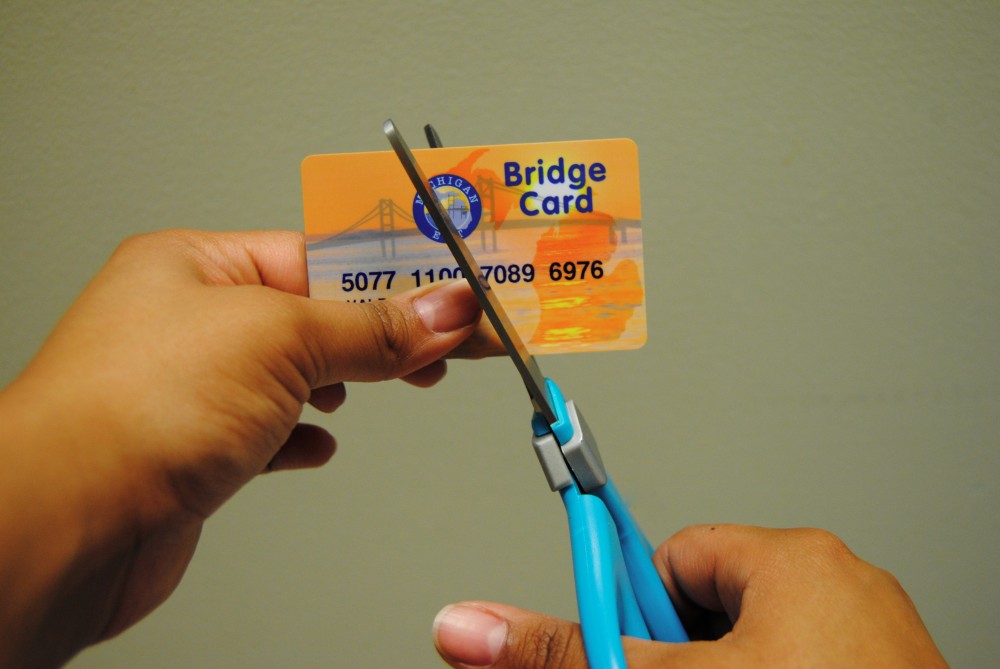BYE BYE BRIDGE CARD

Grand Valley student gets rid of their Bridge Card
Feb 24, 2011
Grand Valley State University psychology major Andrew Taylor remembers the last time he did not have his Bridge Card, when muddled logistics from moving left him without groceries for two months.
“I lived on the beans that were left over in my cupboard,” Taylor said. “So if I didn’t have food stamps, I wouldn’t have any food at all.”
Taylor worries that he will not make the cut come April when Michigan’s Department of Human Services will no longer allow students to automatically qualify for food assistance.
Gisgie Gendreau, press officer for DHS, said federal guidelines dictate only a small number of truly needy students are eligible for a Bridge Card status, and in the past Michigan was granted an exception to those federal guidelines.
“I just want to make sure that it’s clear we were following federal guidelines before and that we are following federal guidelines now,” Gendreau said. “Federal guidelines allowed Michigan to have the exception, and we requested to remove that exception and were granted approval.”
She said concerned citizens brought the subject of student bridge card abuse to the director’s attention. Rep. David Agema (R-Grandville) helped advocate for the renewed restriction and said in a press release issued by DHS early February that he stands behind the decision.
“College students who do not really need assistance have been allowed to take advantage for far too long,” Agema said. “Preventing bridge card abuse will make sure assistance only goes to those who truly need help. This action will put a stop to this waste of tax-payer money.”
Gendreau said between 25,000 and 26,000 people that attended college in fall of 2010 received food assistance. Starting in April, a much smaller, more specific demographic will still make the cut.
“Under the federal guidelines, college students don’t qualify for food assistance except in a small number of instances that include having young children in the home, not being physically able to work and being in an on-the job training program,” Gendreau said.
Agema said those with true need will still be able to get the bridge cards, and those who do not will not.
Michelle Rhodes, director of financial aid, said she worries the change in Bridge Card guidelines will affect many of the commuter students at GVSU who do not have meal plans on campus and might find themselves taking out heftier loans to make ends meet. She said this academic year, 13,000 total students have taken out loans with an average of $6,700 per student per year.
“With anything that you take away from a student, I think it’s really hard because there are a lot of students who need to have their basic needs met, and if the Bridge Card is going to do that and it’s being taken away, for some students, it’s going to really create a hardship,” Rhodes said.
Many worry this sort of blanket take down of student eligibility will bar those who do not quite fit the bill from receiving the food assistance they legitimately need.
Taylor, who can no longer receive scholarships due to his fifth-year senior status, struggles to pay for his rent, and all the while, private loan payments are already turning up in his mailbox.
“I think at this point, it’s not even going to be a negative impact – it’s just going to be impossible,” he said. “There’s going to be no way to pay for anything. I’ve already had to stop paying my credit cards five months ago or so, so I don’t know where money for food is even going to come from.”
Taylor said he empathizes with the governments’ predicament but does not necessarily agree with the way Michigan is handling it.
“I mean, they have to cut it from somewhere, but a blanket cut-off from students seems like the wrong way to do it,” he said. “I feel like there has to be another way.”
In the meantime, Taylor is battling his money matters with reason and chooses to be okay with simply doing what he can in the face of the uncertain months ahead of him.
“I put it on my whiteboard – things that were on my mind going into this semester – and I filled up my entire whiteboard,” he said. “It was really this great kind of catharsis, and I got it all out and then just erased it. Because unfortunately, what are you going to do, you know?”
For more information on Michigan’s Food Assistance Program, visit www.mibridges.michigan.gov/access/.
[email protected]























